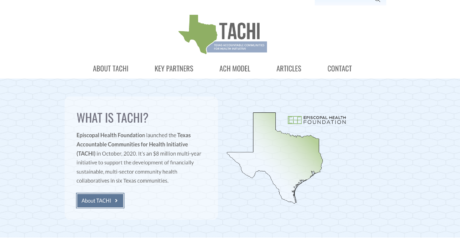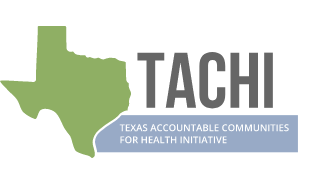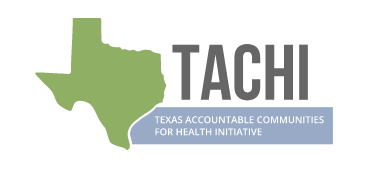Texas Accountable Communities for Health Initiative
Background
Given the growing recognition of how social determinants of health (SDOH) significantly influence health outcomes and healthcare use, policymakers and funders have examined various community-led approaches to address community health. However, SDOH approaches are hampered by a key set of challenges including funding streams being siloed and short-term in nature, individual organizations having competing priorities, data systems being disconnected, equity not being embedded in heath policy and practice, and the lack of authentic engagement of communities and stakeholders. To address these challenges, Episcopal Health Foundation is launching a multi-year initiative to support existing collaboratives in our region to become high-functioning and sustainable entities known as “Accountable Communities for Health”. ACHs are community-based partnerships formed across sectors such as healthcare, housing, social services, public health, employment training, and economic development, to focus on a shared vision and responsibility for the health of the community.
Essentially, ACHs serve as a local platform for bringing stakeholders and community residents together to transform systems to improve community health and achieve greater equity on a sustainable basis rather than provide “one-time” interventions based solely around a health care delivery system. The process by which communities embrace a multisector approach to population health varies by community. As a result, standing up ACHs requires genuine community leadership, intentionality, resources, technical assistance, and opportunities to learn from each other.” Therefore, EHF invested a great deal of time in research and planning to ensure that we establish a thoughtful and impactful ACH initiative.
On October 1st, 2020, Episcopal Health Foundation (EHF) launched the Texas Accountable Communities for Health Initiative (TACHI), which is an $8 million multi-year initiative to support the development of financial sustainable, multi-sector community health collaboratives in six Texas communities.
TACHI offers the six community collaboratives grant funding, technical assistance, and peer-learning opportunities around topics related to health equity, community engagement, governance, data infrastructure, strategy development, etc. that will position them to advance community-led, financially sustainable social determinants of health strategies that improve health outcomes.

Learn more about TACHI – www.txachi.org
Key Partners
Parkland Center for Clinical Innovation (PCCI) serves as the Project Management Office (PMO) for Episcopal Health Foundation’s TACHI project. PCCI is a leading nonprofit, data science, and innovation organization affiliated with Parkland Health & Hospital System, one of the country’s largest and most progressive safety-net hospitals. As the PMO, the PCCI team will provide their unique breadth of expertise, experience, and insight to ensure that the TACHI is positioned for long-term success. PCCI through its PMO role will be responsible for coordinating, facilitating, and managing all TACHI activities, including but not limited to the learning community, technical assistance, and regular communications with TACHI sites.
Georgia Health Policy Center (GHPC) serve as the external Evaluator for TACHI. GHPC, housed within Georgia State University’s nationally ranked Andrew Young School of Policy Studies, integrates research, policy, and programs to advance health and well-being. GHPC’s evaluation portfolio spans the layers of the socio-ecological model and includes individual, multi-site, and meta-level evaluations of community change initiatives and programmatic activities. GHPC conducts evaluations to stimulate program improvement, contribute to learning, and assess impact. As the Evaluator, GHPC will conduct both formative and summative evaluation of TACHI to help the PMO and EHF understand how the initiative is making progress towards the stated goals as well as to capture short-and long-term outcomes of the work.
TACHI Grantee Sites
Austin Rundberg TACHI Site
- The Austin Rundberg area is small, urban community located in the City of Austin bounded by I-35 and Mopac.
- Lone Star Circle of Care will serve as the backbone for this collaborative and the current partners include Dell Medical School and Go Austin/Vamos Austin (GAVA).
Bastrop County TACHI Site
- Bastrop County Cares will serve as the backbone for this collaborative and the current partners include Bastrop County Public Health, Bastrop ISD, Workforce Solutions Rural Capital Area, YMCA, and Bastrop Ministerial Alliance
Brazos Valley TACHI Site
- Texas A&M University will serve as the backbone for this collaborative and the current partners include CHI St. Joseph Regional Health System and HealthPoint.
Greater Northside – Houston TACHI Site
- Avenue CDC will serve as the backbone for this collaborative and the current partners include Memorial Hermann, Wesley Community Center, and the YMCA.
Gregg County TACHI Site
- Community Healthcore will serve as the backbone for this collaborative and the current partners include Special Health Resources of Texas, City of Longview, Longview Fire Department, and CHRISTUS Health.
Williamson County TACHI Site
- Williamson County Health Department will serve as the backbone for this collaborative and the current partners include Ascension Seton, Bluebonnet Trains Community Services, Georgetown Health Foundation, Lone Star Circle of Care, and United Way of Williamson County.
For more information, contact Robiel Abraha, EHF Research and Evaluation officer

